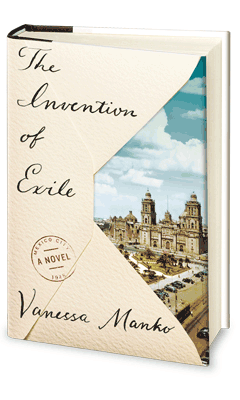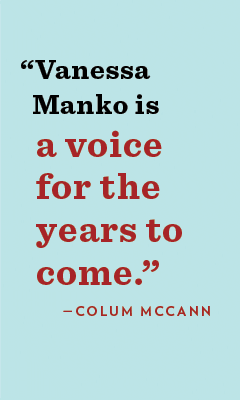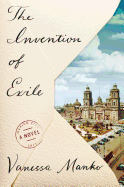The Invention of Exile
by Vanessa Manko
A deceptively simple story about one man's struggle to defy his own inauspicious stars, Vanessa Manko's debut, The Invention of Exile, begins as a straightforward historical novel. Protagonist Austin Voronkov is a man without a country--born in Russia just before the turn of the 20th century, Austin came to the United States in 1913 in search of a better life. His background in engineering served him well, and he found work quickly and consistently. During the day he worked making ammunition, rising through the ranks to become a factory inspector and eventually an engineer. In the evenings he stayed up late, reading books about science and drafting inventions. When he could no longer stand the dingy, cramped workers' dormitories he rented a room in a house where, for $7 a month, he received room and board, as well as help with laundry and shopping from the two teenage daughters of his widowed landlady. He and one of those daughters quickly and quietly fell in love. They took their vows in secret, married in the Russian tradition and in their hearts, if not according to U.S. law.
In 1919, as news of the Bolshevik revolution began to reach the U.S., Austin and his fellow Russians found themselves the target of increasing abuse and suspicion. In response they formed clubs and church groups. After work Austin met with the Russian Social Club in a church basement and listened to lectures on Russian folklore, took English classes, gossiped and worshiped. The Russian Worker's Union interested him less, with all the talk of "workers, society, capitalists," although he attended a few meetings.
Austin didn't believe himself to be a "worker," with all his education and his position as an engineer at the Connecticut Remington Arms Factory. Unfortunately for him, the U.S. government didn't understand the distinction between Austin's passion for scientific principles and the anarcho-communist Bolshevism of his compatriots. In the end, it was his poor grasp of English that did him in. When asked if he was an advocate for revolution he could only say, "I do not know." Austin lacked the words to protest, and so he found himself deported back to his parents' home in what was now the U.S.S.R.
Julia, his loyal, loving wife, followed him, and over the next decade they bounced from country to country, living in Russia and the Ukraine, then Paris and finally Mexico. They had three children, all born nationless. After a few years vainly petitioning from Mexico for Austin to be allowed back into the U.S., Julia and the children were advised to return without Austin, and were told it should be a matter of weeks before he could join them, that with Julia advocating from the inside, things would move more quickly. Those weeks, however, stretched into months, then a year, then another.
Austin became convinced that his many inventions, drafted on expensive paper and mailed off to the U.S. patent office, would eventually prove him worthy of citizenship. He became a shadow, sliding quietly along the streets of Mexico City until a surprise letter from his now-grown daughter changed everything. Although it's a story worthy of a Tolstoyian epic, The Invention of Exile speeds through the interpersonal drama and the global travel that, in another book, might occupy hundreds of pages. Manko tells the story not of an external journey but of an internal decay. It's an anti-adventure novel, a stark portrayal of a man who "wore down his mind" with endless hoping, whose achievements were lost to time and bureaucracy.
Although darkness is at the heart of The Invention of Exile, Manko's writing is full of light. There are colors everywhere, from the many tints of the copper mines Austin toiled in during those first years in Mexico ("a morning's blue before the sun, the violet gray of evening... emerging out of rock and dirt, reddish against the camel-colored dust... a yucca plant's spiky leaves black beneath a cobalt sky") to the colors of the moment when his wife and children boarded the train home, leaving Austin behind in Mexico ("she in her navy frock... he in his gray suit, a white shirt, stained brown at the collar... they leave Cananea in the blue of morning. The horizon is rimmed in white... in an hour, the sun will breach the horizon, golden and full.")
If at first the narration seems uninterested in his time in the U.S. and his brief return to Russia, that is because those moments faded in Austin's memory to a series of impressions held together by dates, certain shades of light reflecting off lost places. Only light and color are left, like the supposed "Red"-ness that caused American officials to turn their back on Austin when he begged to be allowed to apply for citizenship. Or the "bruised yellow, mauve... charcoal gray" skies of the unwelcoming city of Paris, one more place where he was unable to build a life. Or the shadow of the photographer in the foreground of a photograph--the only evidence that he and his wife were once together, laughing in the arid heat of the Mexican desert.
Manko writes in a lyrical, fluid style, yet behind the carefully crafted prose is a sense of dislocation, a slight disconnect between the words and the story. The Invention of Exile leaves the reader with the sense that Manko has wrapped words around the ineffable, that the book is reaching to describe something language fails to encompass. This echoes Austin's own discomfort with language, which constantly betrays him. Although he yearns to make America his home, his imperfect grasp of English causes him to be deported just as he is beginning to build a new life. Later, in Mexico, his Russian accent and his imperfect Spanish betray his foreign origins, even after 14 years in that country. As the years go by in Mexico, from 1937 through the 1940s, "far back the walls of his village--stone by stone--began to disappear, the foundation of childhood now intact only in memory, he now an exile of two countries." Austin is an exile in Mexico, refusing that nation's quiet embrace in favor of the fevered, endless pursuit of repatriation to America. Reflecting back on his life, Austin thinks that "another man may find in it adventure. From a different perspective, vantage point, perhaps it was, but he'd wanted a home and what was that but to wander day in, day out among the same knowable streets... to be seen and known." Austin's exile is so profound that he loses not only "home," but his very understanding of what that word means. Hope, too, becomes a burden rather than a source of light. Austin Voronkov is a man who has been translated too many times, worn thin by passing through too many iterations of his self. The Invention of Exile is a portrait of what happens when hoping overtakes the reality of what is hoped for, and when being an exile becomes more important than the place that you once called home. --Emma Page








 Vanessa Manko
Vanessa Manko